Memoir of John Shakespear Bartley, 1916-1919 - Part 24
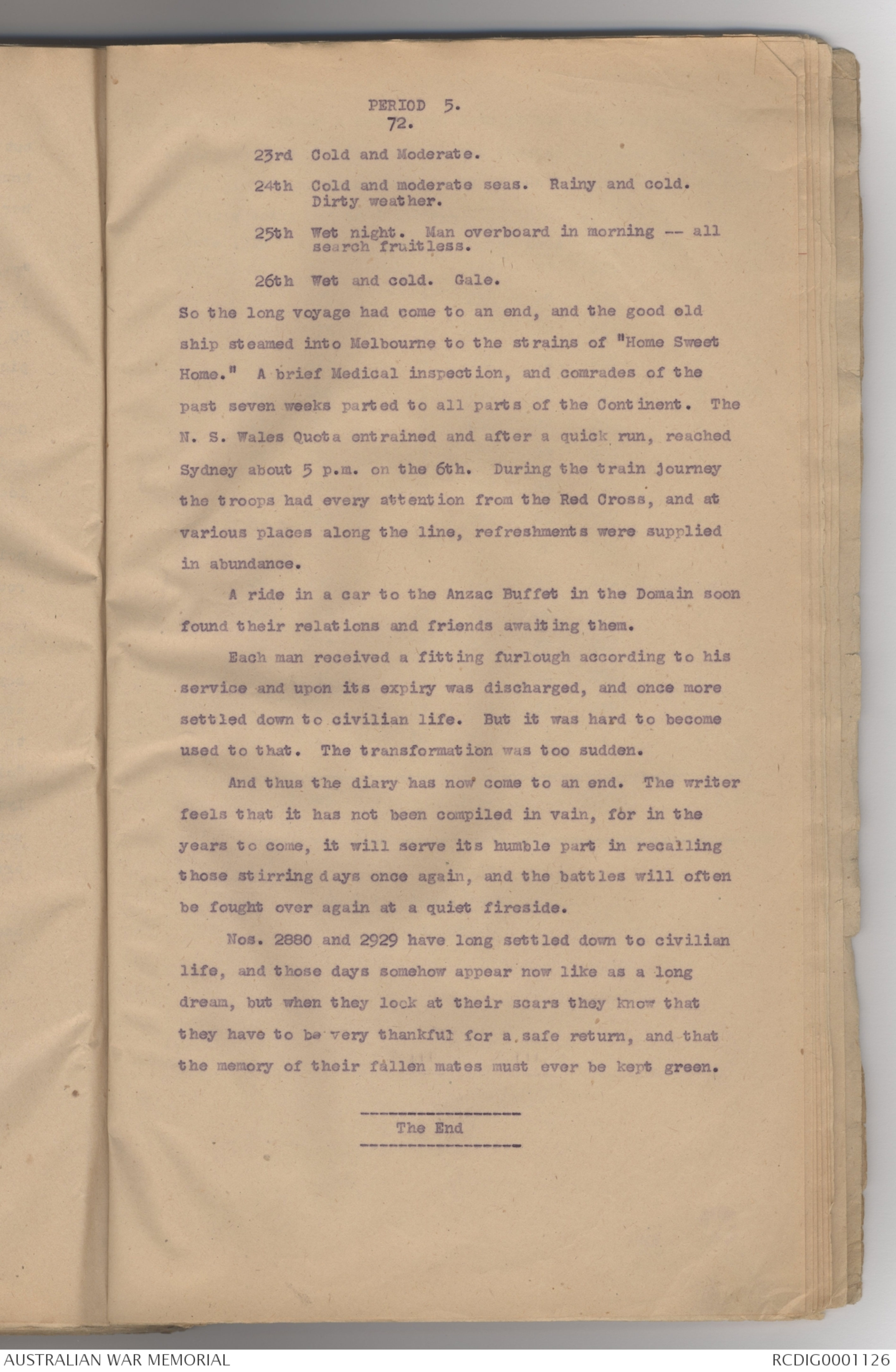
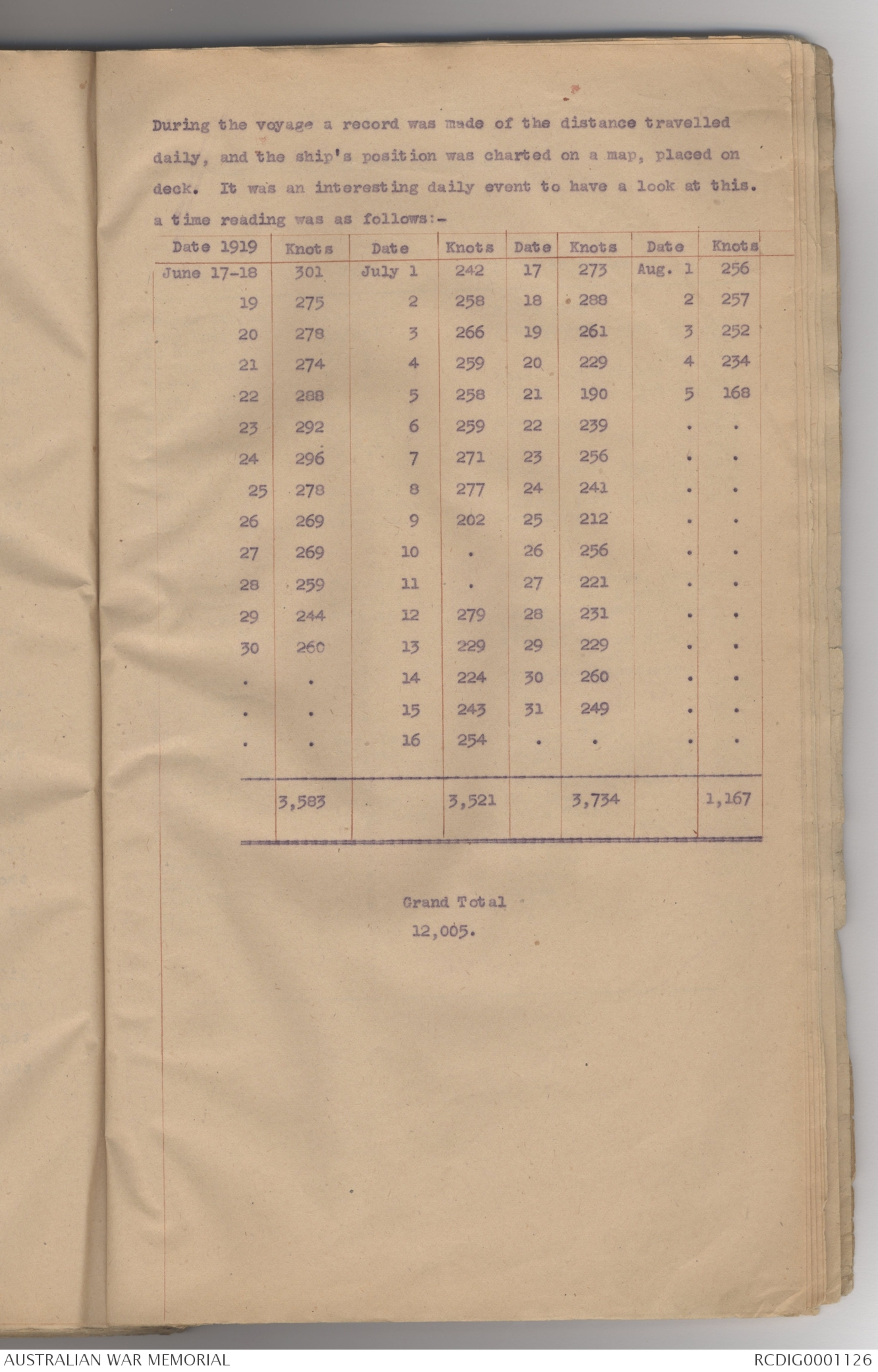
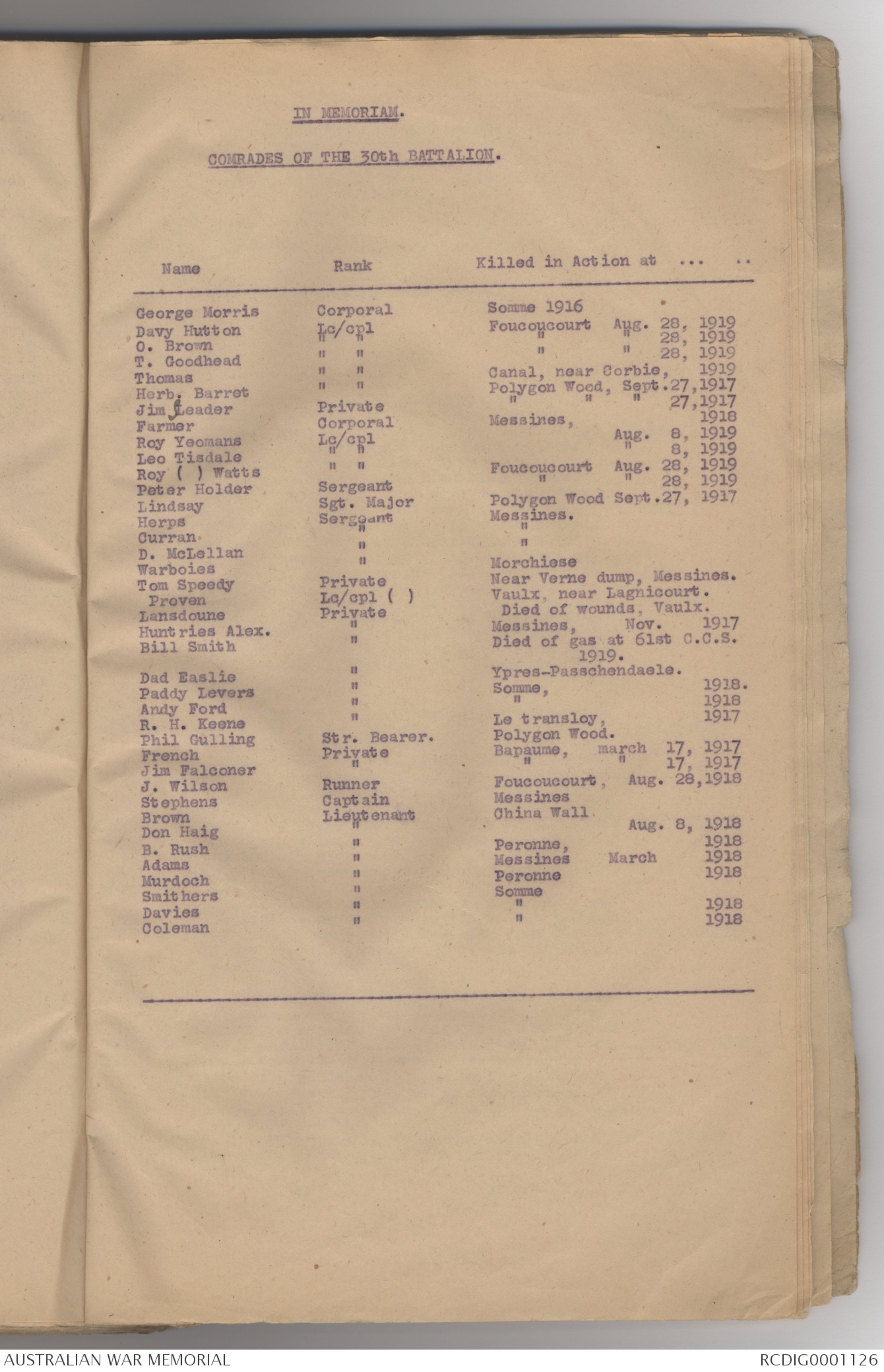
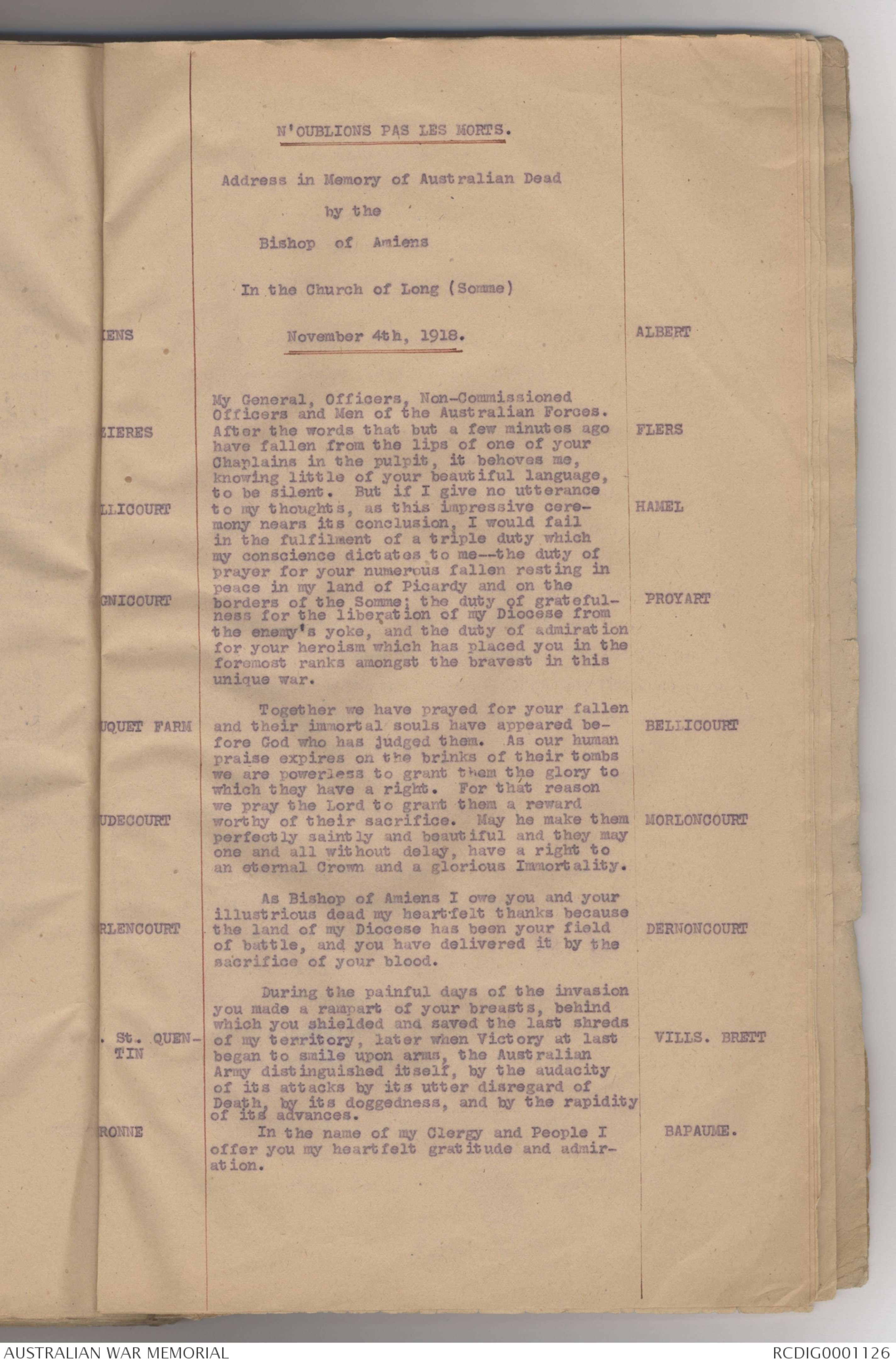
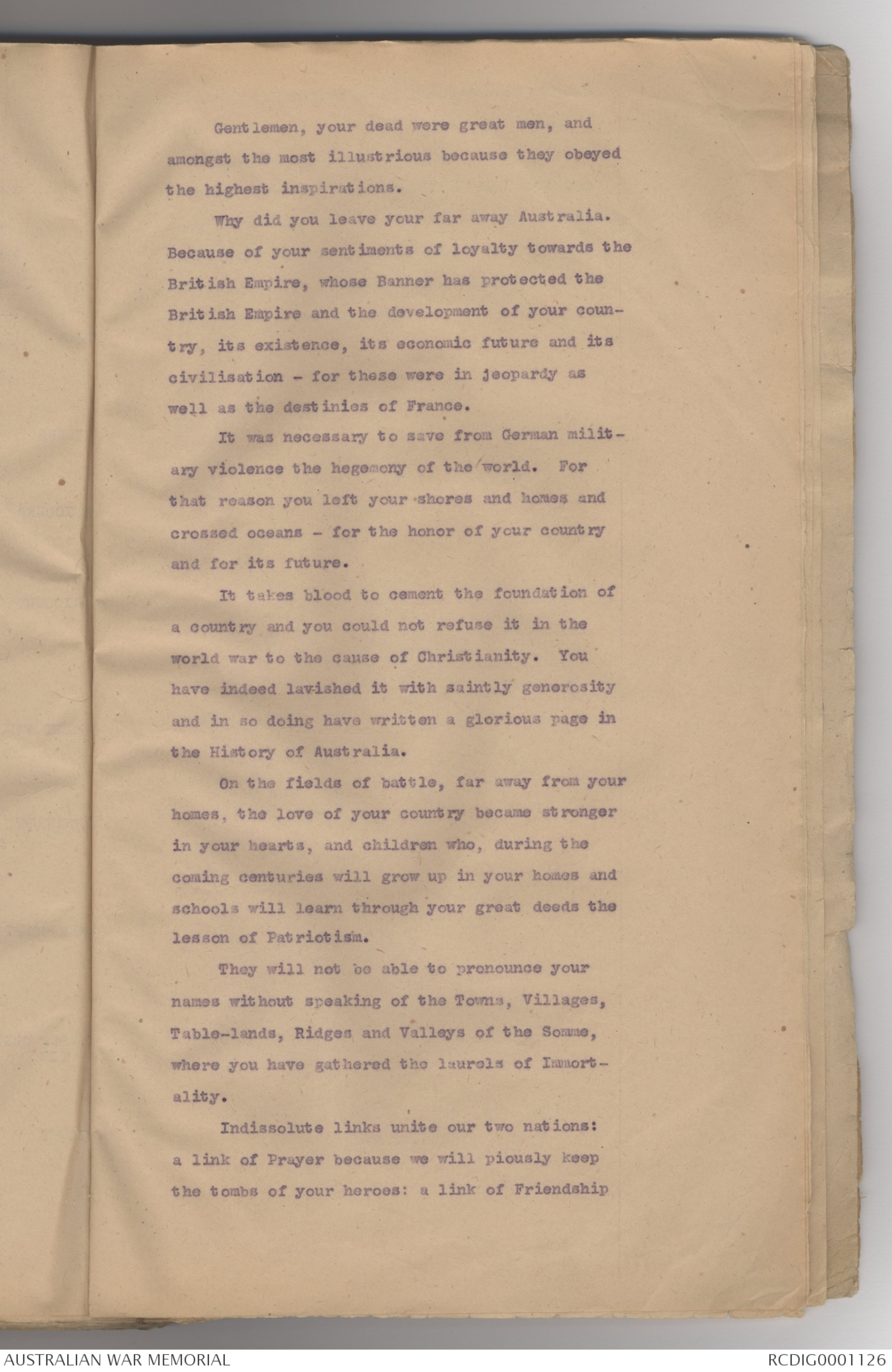
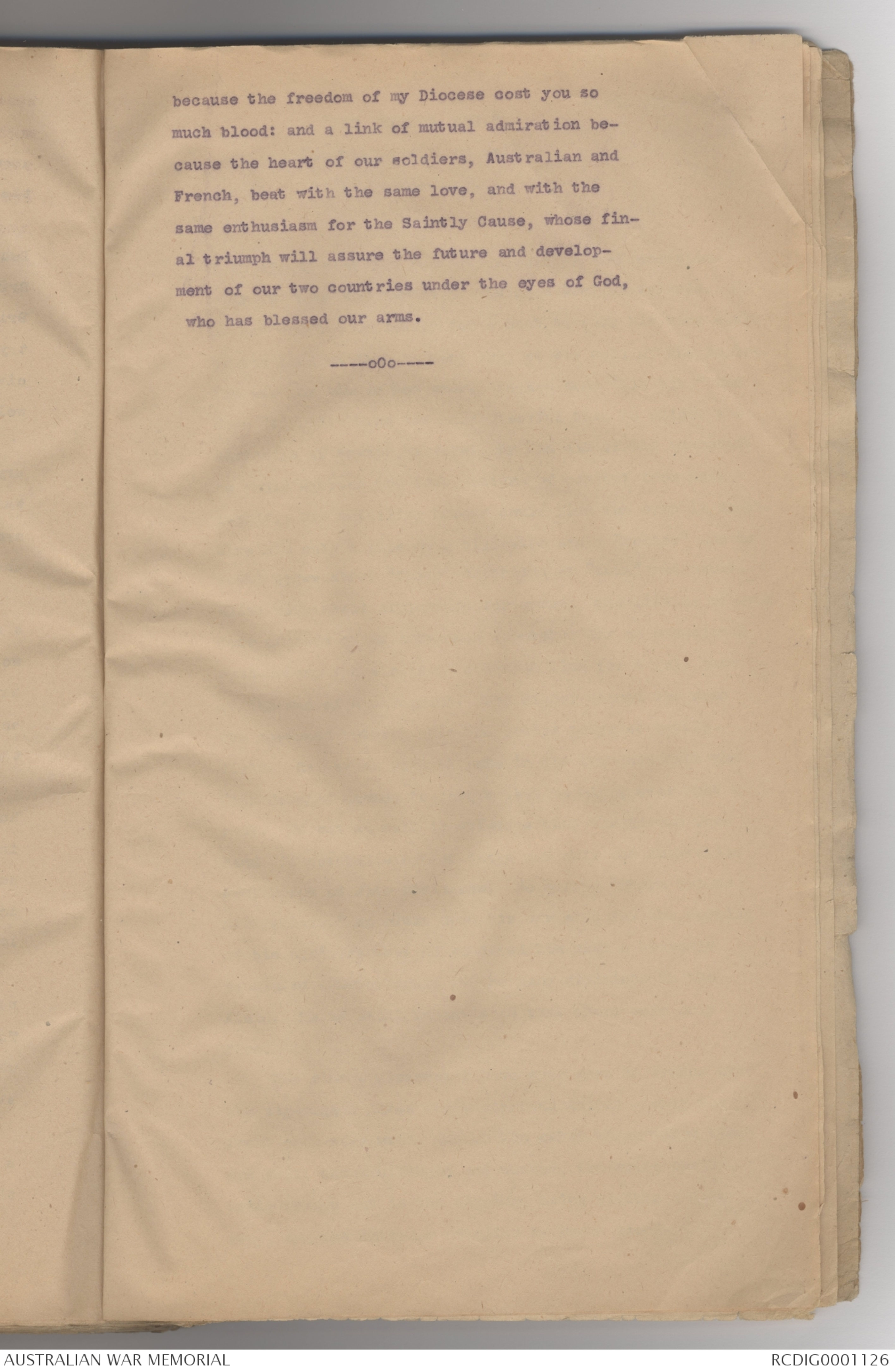
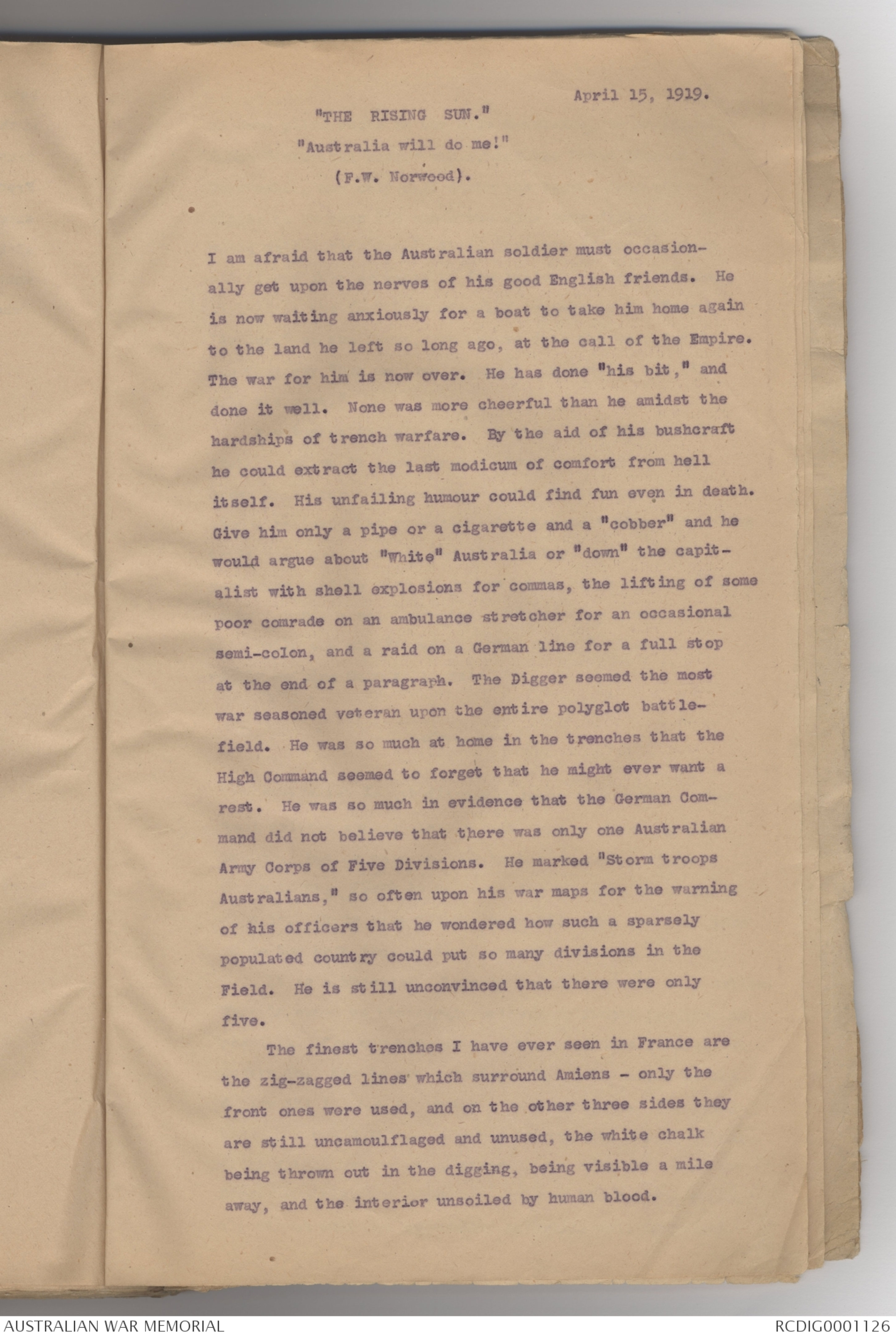
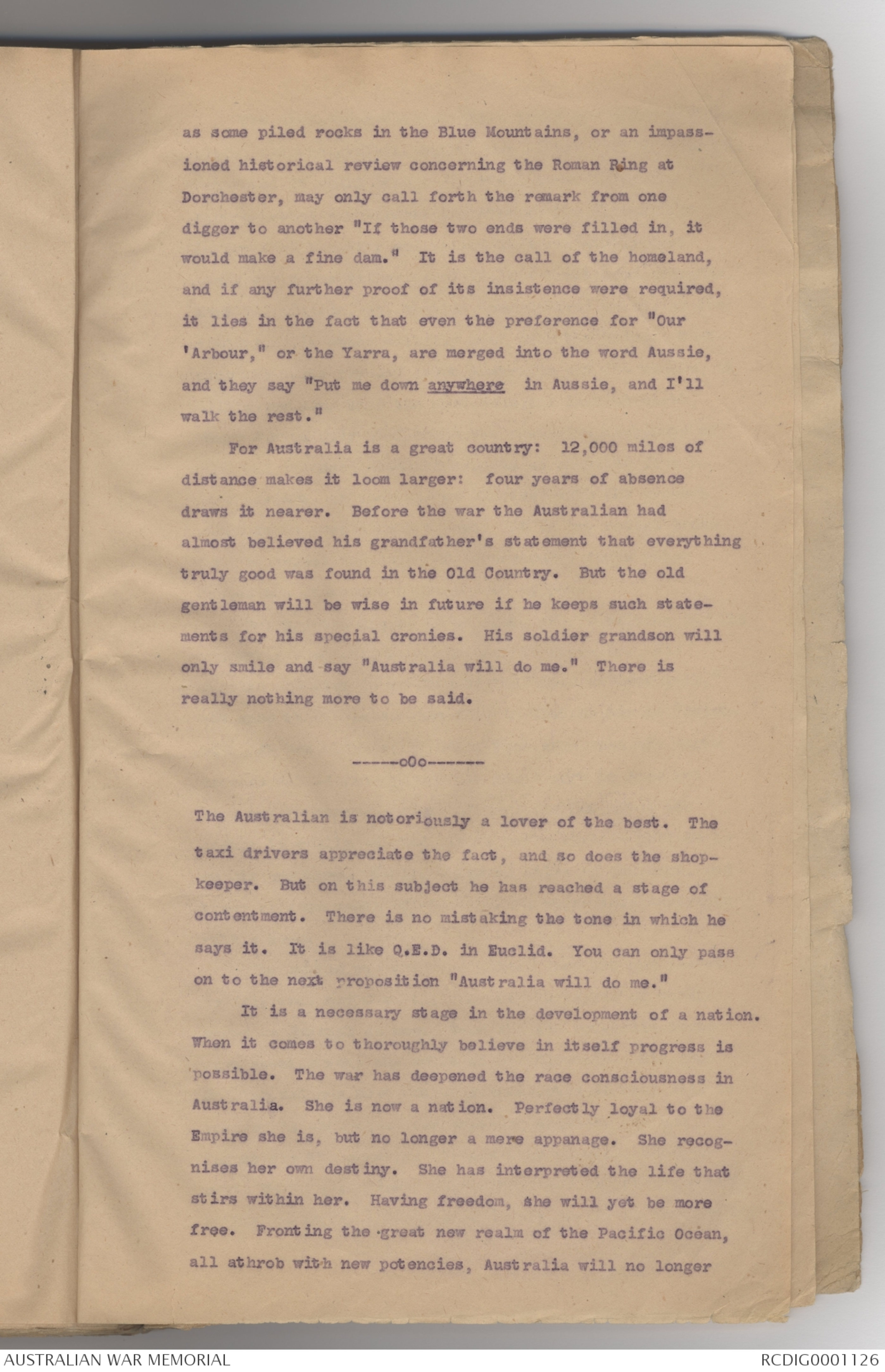
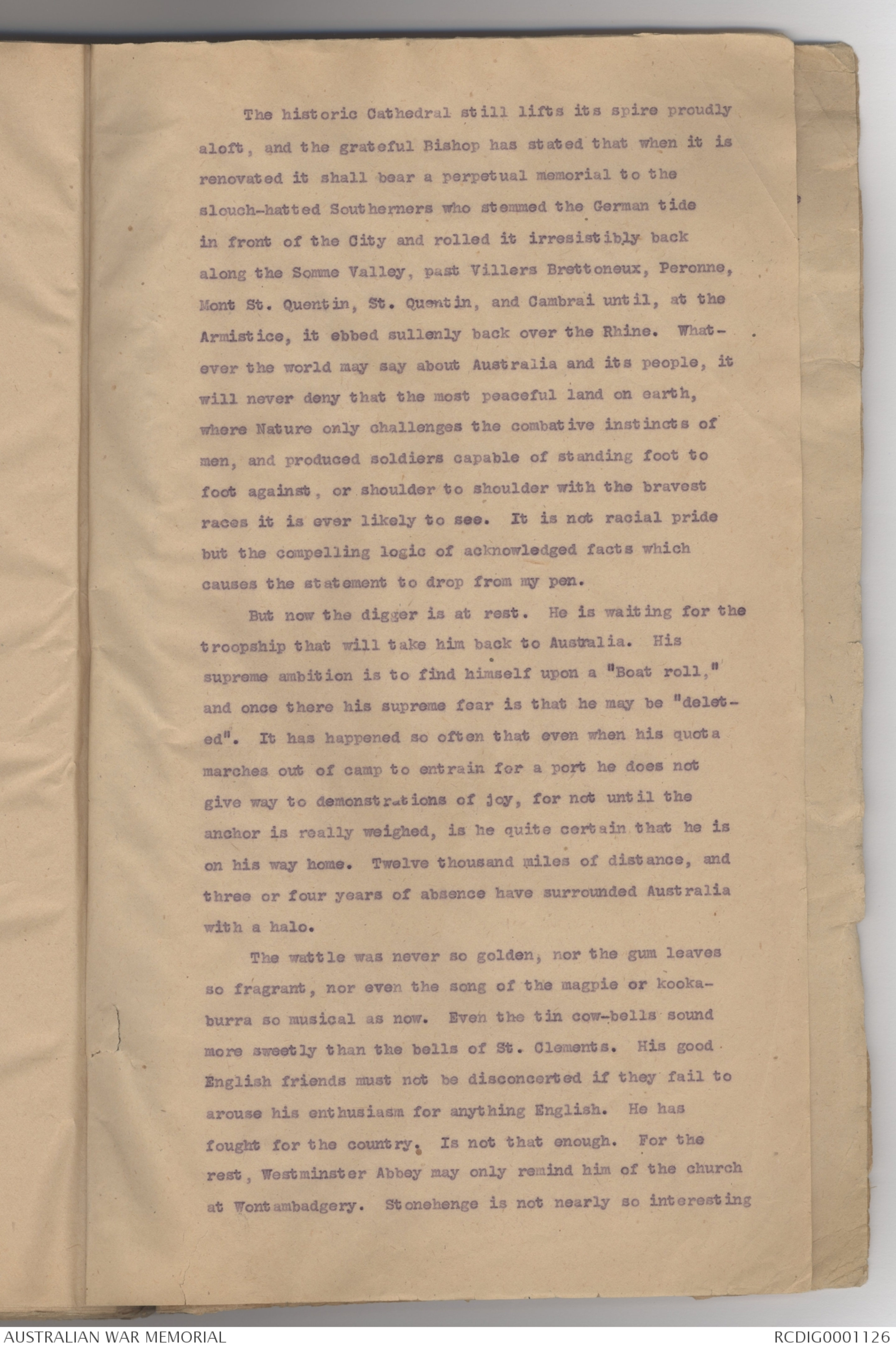
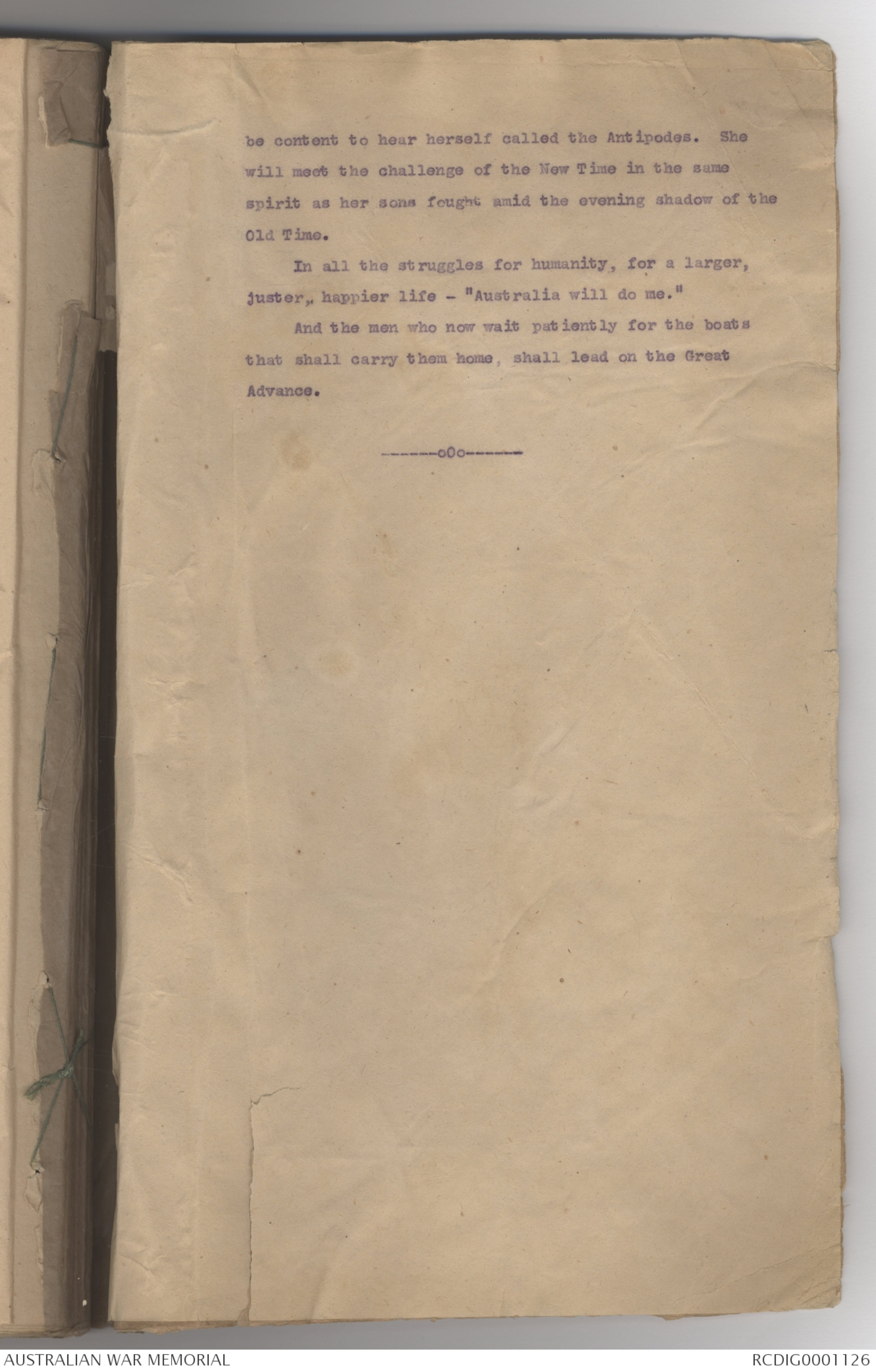
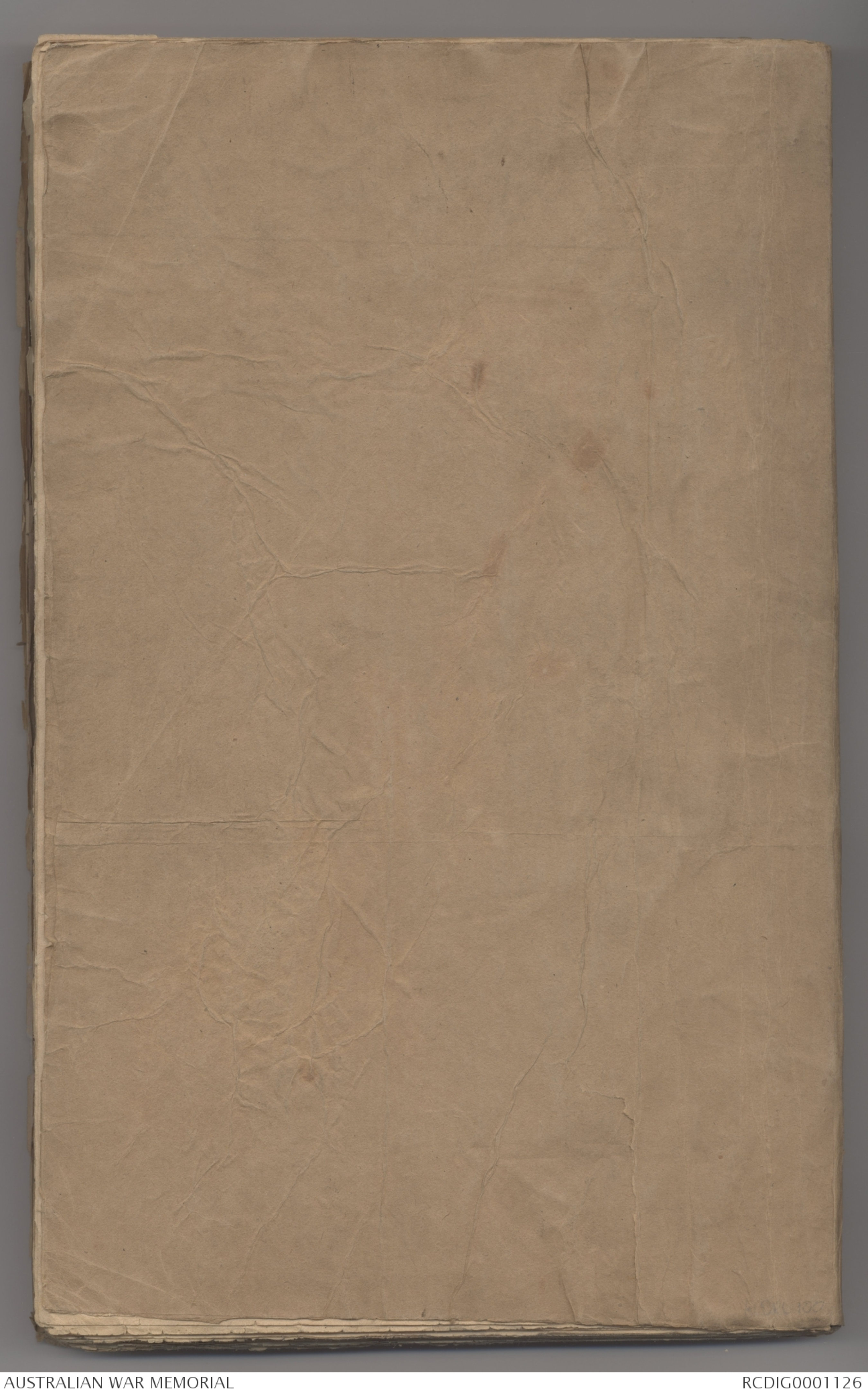
PERIOD 5.
72.
23rd Cold and Moderate.
24th Cold and moderate seas. Rainy and cold.
Dirty weather.
25th Wet night. Man overboard in morning – all
search fruitless.
26th Wet and cold. Gale.
So the long voyage had come to an end, and the good old
ship steamed into Melbourne to the strains of "Home Sweet
Home." A brief Medical inspection, and comrades of the
past seven weeks parted to all parts of the Continent. The
N. S. Wales Quota entrained and after a quick run, reached
Sydney about 5 p.m. on the 6th. During the train journey
the troops had every attention from the Red Cross, and at
various places along the line, refreshments were supplied
in abundance.
A ride in a car to the Anzac Buffet in the Domain soon
found their relations and friends awaiting them.
Each man received a fitting furlough according to his
service and upon its expiry was discharged, and once more
settled down to civilian life. But it was hard to become
used to that. The transformation was too sudden.
And thus the diary has now come to an end. The writer
feels that it has not been compiled in vain, for in the
years to come, it will serve its humble part in recalling
those stirring days once again, and the battles will often
be fought over again at a quiet fireside.
Nos. 2880 and 2929 have long settled down to civilian
life, and those days somehow appear now like as a long
dream, but when they look at their scars they know that
they have to be very thankful for a safe return, and that
the memory of their fallen mates must ever be kept green.
----------------
The End
-----------------
During the voyage a record was made of the distance travelled
daily, and the ship's position was charted on a map, placed on
deck. It was an interesting daily event to have a look at this.
a time reading was as follows:-
| Date 1919 | Knots | Date | Knots | Date | Knots | Date | Knots |
| June 17-18 | 301 | July 1 | 242 | 17 | 273 | Aug. 1 | 256 |
| 19 | 275 | 2 | 258 | 18 | 288 | 2 | 257 |
| 20 | 278 | 3 | 266 | 19 | 261 | 3 | 252 |
| 21 | 274 | 4 | 259 | 20 | 229 | 4 | 234 |
| 22 | 288 | 5 | 258 | 21 | 190 | 5 | 168 |
| 23 | 292 | 6 | 259 | 22 | 239 | . |
. |
| 24 | 296 | 7 | 271 | 23 | 256 | . |
. |
| 25 | 278 | 8 | 277 | 24 | 241 | . |
. |
| 26 | 269 | 9 | 202 | 25 | 212 | . |
. |
| 27 | 269 | 10 | . | 26 | 256 | . |
. |
| 28 | 259 | 11 | . | 27 | 221 | . |
. |
| 29 | 244 | 12 | 279 | 28 | 231 | . |
. |
| 30 | 260 | 13 | 229 | 29 | 229 | . |
. |
| . | . | 14 | 224 | 30 | 260 | . |
. |
| . | . | 15 | 243 | 31 | 249 | . |
. |
| . | . | 16 | 254 | . | . | . |
. |
| 3,583 | 3,521 | 3,754 | 1,167 |
Grand Total
12,005.
IN MEMORIAM.
COMRADES OF THE 3Oth BATTALION.
| Name | Rank | Killed in Action at ... .. |
| George Morris | Corporal | Somme 1916 |
| Davy Hutton | Lc/cpl | Foucoucourt Aug. 28, 1919 |
| O. Brown | " " | " " 28, 1919 |
| T. Goodhead | " " | " " 28, 1919 |
| Thomas | " " | Canal, near Corbie, 1919 |
| Herb. Barret | " " | Polygon Wood, Sept.27,1917 |
| Jim. Leader | Private | " " " 27,1917 |
| Farmer | Corporal | Messines, 1918 |
| Roy Yeomans | Lc/cpl | Aug. 8, 1919 |
| Leo Tisdale | " " | '' 8, 1919 |
| Roy ( ) Watts | " " | Foucoucourt Aug. 28, 1919 |
| Peter Holder | Sergeant | " " 28, 1919 |
| Lindsay | Sgt. Major | Polygon Wood Sept.27, 1917 |
| Herps | Sergeant | Messines. |
| Curran | " | " |
| D. McLellan | " | " |
| Warboies | " | Morchiese |
| Tom Speedy | Private | Near Verne dump, Messines. |
| Proven | Lc/cpl ( ) | Vaulx, near Lagnicourt. |
| Lansdoune | Private | Died of wounds, Vaulx. |
| Huntries Alex. | " | Messines, Nov. 1917 |
| Bill Smith | " |
Died of gas at 61st C.C.S. 1919. |
| Dad Easlie | " | Ypres-Passchendaele. |
| Paddy Levers | " | Somme, 1918. |
| Andy Ford | " | " 1918 |
| R.H. Keene | " | Le transloy, 1917 |
| Phil Gulling | Str. Bearer. | Polygon Wood. |
| French | Private | Bapaume, march 17, 1917 |
| Jim Falconer | " | " " 17, 1917 |
| J. Wilson | Runner | Foucoucourt, Aug. 28, 1918 |
| Stephens | Captain | Messines |
| Brown | Lieutenant | China Wall |
| Don Haig | " | Aug. 8, 1918 |
| B. Rush | " | Peronne, 1918 |
| Adams | " | Messines March 1918 |
| Murdoch | " | Peronne 1918 |
| Smithers | " | Somme |
| Davies | " | " 1918 |
| Coleman | " | " 1918 |
N'OUBLIONS PAS LES MORTS.
Address in Memory of Australian Dead
by the
Bishop of Amiens
In the Church of Long (Somme)
|
ENIES
LIERES
LLICOURT
ONICOURT
UQUET FARM
UDECOURT
RLENCOURT
. St. QUENTIN
RONNE
|
November 4th, 1918. My General, Officers, Non-Commissioned peace in my land of Picardy and on the for the liberation of my Diocese from Together we have prayed for your fallen and their immortal souls have appeared before God who has judged them. As our human praise expires on the brinks of their tombs an eternal Crown and a glorious Immortality. As Bishop of Amiens I owe you and your illustrious dead my heartfelt thanks because During the painful days of the invasion In the name of my Clergy and People I |
ALBERT
FLERS
HANEL
PROYART
BELLICOURT
MORLONCOURT
DERNONCOURT
VILLS, BRETT
BAPAUME.
|
Gentlemen, your dead were great men, and
amongst the most illustrious because they obeyed
the highest inspirations.
Why did you leave your far away Australia.
Because of your sentiments of loyalty towards the
British Empire, whose Banner has protected the
British Empire and the development of your country,
ts existence, its economic future and its
civilisation - for these were in jeopardy as
well as the destinies of France.
It was necessary to save from Cerman military
violence the hegemony of the world. For
that reason you left your shores and homes and
crossed oceans - for the honor of your country
and for its future.
It takes blood to cement the foundation of
a country and you could not refuse it in the
world war to the cause of Christianity. You
have indeed lavished it with saintly generosity
and in so doing have written a glorious page in
the History of Australia.
On the fields of battle, far away from your
homes, the love of your country became stronger
in your hearts, and children who, during the
coming centuries will grow up in your homes and
schools will learn through your great deeds the
lesson of Patriotism.
They will not be able to pronounce your
names without speaking of the Towns, Villages,
Table-lands, Ridges and Valleys of the Somme,
where you have gathered the laurels of Immortality.
Indissolute links unite our two nations:
a link of Prayer because we will piously keep
the tombs of your heroes: a link of Friendship
because the freedom of my Diocese cost you so
much blood: and a link of mutual admiration because
the heart of our soldiers, Australian and
French, beat with the same love, and with the
same enthusiasm for the Saintly Cause, whose final
triumph will assure the future and development
of our two countries under the eyes of God,
who has blessed our arms.
----oOo----
April 15, 1919.
"THE RISING SUN."
"Australia will do me!"
(F.W. Norwood).
I am afraid that the Australian soldier must occasionally
get upon the nerves of his good English friends. He
is now waiting anxiously for a boat to take him home again
to the land he left so long ago, at the call of the Empire.
The war for him is now over. He has done "his bit," and
done it well. None was more cheerful than he amidst the
hardships of trench warfare. By the aid of his bushcraft
he could extract the last modicum of comfort from hell
itself. His unfailing humour could find fun even in death.
Give him only a pipe or a cigarette and a "cobber" and he
would argue about "White" Australia or "down" the capitalist
with shell explosions for commas, the lifting of some
poor comrade on an ambulance stretcher for an occasional
semi-colon, and a raid on a German line for a full stop
at the end of a paragraph. The Digger seemed the most
war seasoned veteran upon the entire polyglot battlefield.
He was so much at home in the trenches that the
High Command seemed to forget that he might ever want a
rest. He was so much in evidence that the German Command
did not believe that there was only one Australian
Army Corps of Five Divisions. He marked "Storm troops
Australians," so often upon his war maps for the warning
of his officers that he wondered how such a sparsely
populated country could put so many divisions in the
Field. He is still unconvinced that there were only
five.
The finest trenches I have ever seen in France are
the zig-zagged lines which surround Amiens - only the
front ones were used, and on the other three sides they
are still uncamoulflaged and unused, the white chalk
being thrown out in the digging, being visible a mile
away, and the interior unsoiled by human blood.
as some piled rocks in the Blue Mountains, or an impassioned
historical review concerning the Roman Ring at
Dorchester, may only call forth the remark from one
digger to another "If those two ends were filled in, it
would make a fine dam." It is the call of the homeland,
and if any further proof of its insistence were required,
it lies in the fact that even the preference for "Our
'Arbour," or the Yarra, are merged into the word Aussie,
and they say "Put me down anywhere in Aussie, and I'll
walk the rest."
For Australia is a great country: 12,000 miles of
distance makes it loom larger: four years of absence
draws it nearer. Before the war the Australian had
almost believed his grandfather's statement that everything
truly good was found in the Old Country. But the old
gentleman will be wise in future if he keeps such statements
for his special cronies. His soldier grandson will
only smile and say "Australia will do me." There is
really nothing more to be said.
----oOo----
The Australian is notoriously a lover of the best. The
taxi drivers appreciate the fact, and so does the shopkeeper.
But on this subject he has reached a stage of
contentment. There is no mistaking the tone in which he
says it. It is like Q.E.D. in Euclid. You can only pass
on to the next proposition "Australia will do me."
It is a necessary stage in the development of a nation.
When it comes to thoroughly believe in itself progress is
possible. The war has deepened the race consciousness in
Australia. She is now a nation. Perfectly loyal to the
Empire she is, but no longer a mere appanage. She recognises
her own destiny. She has interpreted the life that
stirs within her. Having freedom, she will yet be more
free. Fronting the great new realm of the Pacific Océan,
all athrob with new potencies, Australia will no longer
The historic Cathedral still lifts its spire proudly
aloft, and the grateful Bishop has stated that when it is
renovated it shall bear a perpetual memorial to the
slouch-hatted Southerners who stemmed the German tide
in front of the City and rolled it irresistibly back
along the Somme Valley, past Villers Brettoneux, Peronne,
Mont St. Quentin, St. Quentin, and Cambrai until, at the
Armistice, it ebbed sullenly back over the Rhine. Whatever
the world may say about Australia and its people, it
will never deny that the most peaceful land on earth,
where Nature only challenges the combative instincts of
men, and produced soldiers capable of standing foot to
foot against, or shoulder to shoulder with the bravest
races it is ever likely to see. It is not racial pride
but the compelling logic of acknowledged facts which
causes the statement to drop from my pen.
But now the digger is at rest. He is waiting for the
troopship that will take him back to Australia. His
supreme ambition is to find himself upon a "Boat roll,'
and once there his supreme fear is that he may be "deleted".
It has happened so often that even when his quota
marches out of camp to entrain for a port he does not
give way to demonstrations of joy, for not until the
anchor is really weighed, is he quite certain that he is
on his way home. Twelve thousand miles of distance, and
three or four years of absence have surrounded Australia
with a halo.
The wattle was never so golden, nor the gum leaves
so fragrant, nor even the song of the magpie or kookaburra
so musical as now. Even the tin cow-bells sound
more sweetly than the bells of St. Clements. His good
English friends must not be disconcerted if they fail to
arouse his enthusiasm for anything English. He has
fought for the country. Is not that enough. For the
rest, Westminster Abbey may only remind him of the church
at Wontambadgery. Stonehenge is not nearly so interesting
be content to hear herself called the Antipodes. She
will meet the challenge of the New Time in the same
spirit as her sons fought amid the evening shadow of the
Old Time.
In all the struggles for humanity, for a larger,
juster, happier life - "Australia will do me."
And the men who now wait patiently for the boats
that shall carry them home, shall lead on the Great
Advance.
----oOo----
 Daphne
DaphneThis transcription item is now locked to you for editing. To release the lock either Save your changes or Cancel.
This lock will be automatically released after 60 minutes of inactivity.